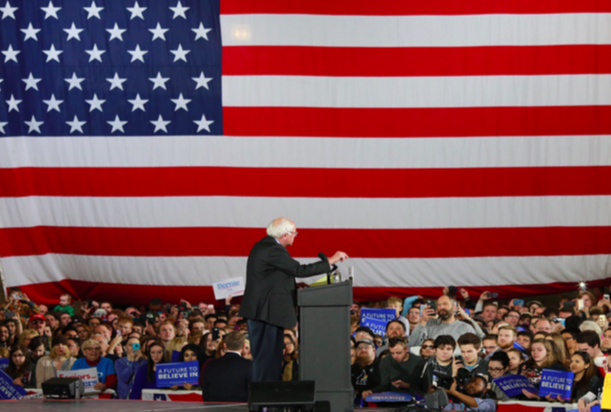Bernie Sanders makes exorbitant, impractical claims
Courtesy of BernieSanders.com press release
A young crowd –– Sanders speaks at a recent rally to an audience of primarily millennials. Sanders has a clear lead over his competitor Hillary Clinton in this demographic.
April 8, 2016
Democratic Presidential hopeful Bernie Sanders has garnered much attention throughout his campaign, while running against opponent and Former Secretary of State Hillary Clinton.
Sanders currently holds a position as a United States (US) Senator for the state of Vermont, and has gained a following of liberal, mostly young supporters, who rally to his cry of a “political revolution.”
The “revolution” that Sanders is promising has been made before- mainly by men like Michael Dukakis, Ralph Nader and more anti-establishment outsider Democrats or independents. However, as history shows, these revolutions or sweeping reforms are not only lacking in support by the nation as a whole but also abroad. Historically, the US retreating inward to focus solely on domestic issues results in a high amount of isolationism which has never ended well.
The sweeping reforms and drastic changes that Sanders proposes rarely work out as designed. The major domestic and foreign policy changes that he hopes to implement would not only alienate the moderates and republicans that populate Congress but also our allies abroad.
Organizations like NATO and the United Nations rely on US military spending and intervention to execute their policies globally. Sander’s believes in heavily de-militarizing the United States and transitioning to a far more diplomatic form of government. Yet, as a nation, the U.S. spends 54% of its federal discretionary budget on military. With such a military dependent economy abroad, the effective minimizing of the United States military would not only pose a security threat but also a major blow to an international market or weaponry and technology.
US military bases in Western Europe – targets by Sanders as unnecessary military spending – seem ever more necessary as Russia continues to advance into Europe, as shown by Russia’s annexation of Crimea from Ukraine in 2013.
Sanders’ foreign policy, as a result, lacks foundation, due to the fact the United States has been a major world player and ally to many for decades.
The United States, although securing its own sphere of influence, has done so, not as an intruding world power, but as an ally. This narrative is important when attempting to reduce the influence of the US, as although this country has made serious missteps in nations like Iraq, Afghanistan, and now Syria, the intentions of the US have been almost nothing but benign in Europe and abroad. And with a massive population of young people in the US, it is important that we remain interconnected with the rest of the globe, especially Europe.
Sanders has received an overwhelming amount of millennial or young adult support, mainly due to his appeal over social liberalism. Millennials, who are individuals up to age 35 as of 2016, are known for demanding a society where they can self-determine and problem solve. Possibly the most defining aspect of the millennial generation is that they strive to use ungenuine solutions to solve problems on local, national, or global levels.
Sanders’ platform echoes the attitudes of millennials by promising a “revolution” where corporations don’t rule, public college education is free, and most resoundingly, getting money out of politics.
The problem, however, with many of Sanders’ policies, is the impracticality of them. Sanders, whose appeal is going against the status quo in Washington, was voted by the Lugar Center and Georgetown University’s McCourt School of Public Policy as the most partisan candidate, even over republican candidate Ted Cruz, who is also considered to be radically anti-establishment.
With policies and bills that are estimated to cost upwards of $75 billion, Sanders needs bipartisan support. And although he has the support of the millennial generation, Sanders lacks the same zeal from his fellow congressmen. Although we like to think of ourselves as a pure democracy where each citizen has a say in lawmaking and who becomes the next commander-in-chief, we are in fact a representative democracy.
This means that there can be as many millennials cheering for Sanders as humanly possible, but if Sanders is in fact elected, he will have to battle a Republican majority Congress with his radically progressive policies.
His supporters, which are primarily of a young demographic, are somewhat overzealous and optimistic, failing to see the impracticality of passing legislation which could total in the trillions.
Sanders is no doubt bringing up necessary change that needs to occur within the US today, but his proposed legislation demands too much change in too little time, and it’s crucial to note that his competitor in the Democratic party is a much more moderate, bipartisan type of candidate, with a lot of policies that mirror Sanders’ proposals, yet with a moderate spin.
Regardless of who receives the nomination and ultimately the final vote, it’s important to remain educated and vigilant in choosing the next President of the US.


